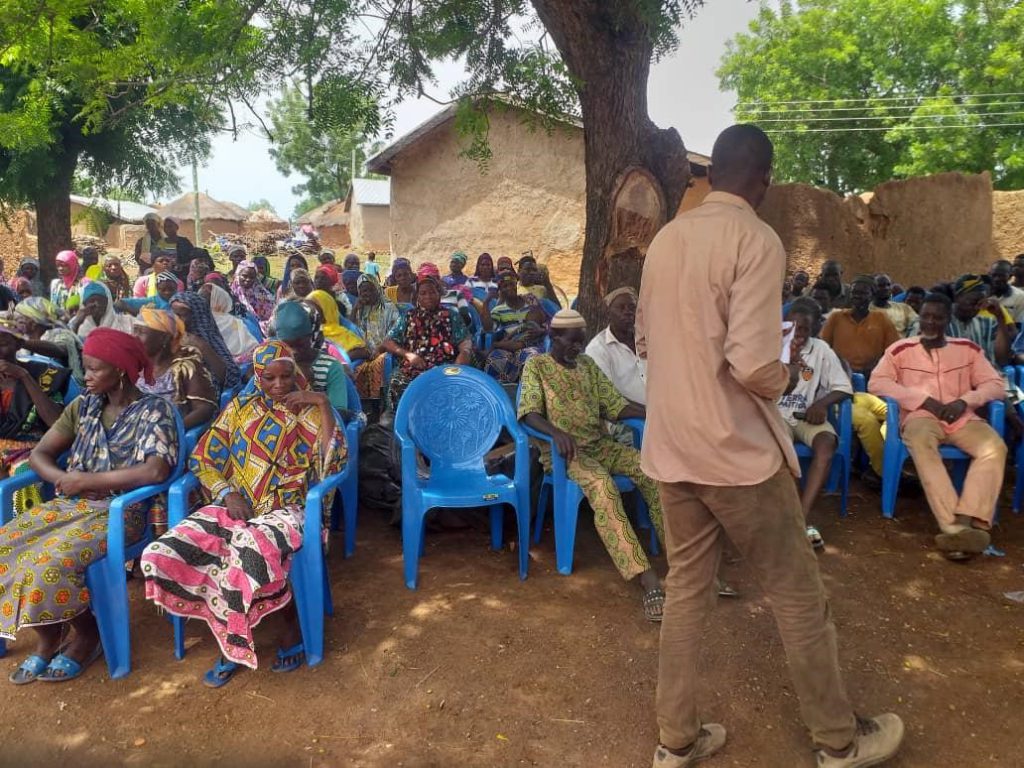
In a bid to promote sustainable management of shea parklands, Shea Network Ghana (SNG) recently conducted a comprehensive training session at Jantong Dashie in the North East Gonja District. This initiative, a key performance indicator under Activity 1 of Output 2 of the Ghana Shea Landscape Emissions Reduction Project (GSLERP), aimed to equip community members with the necessary skills and knowledge to restore and maintain shea parklands.
The two-day training, which took place on May 16th and 17th, 2024, saw the participation of 215 community members, including women collectors, chiefs, elders, assembly members, and agricultural officers. The sessions were facilitated by Iddrisu Ibrahim, Plantations and Sustainability Officer; Thomas Babinah, Project Volunteer; and Fuseini Issah, Women and Cooperatives Development Officer.
Key Focus Areas and Methodology
The training focused on four main intervention areas: development of local conventions and by-laws, grafting, Farmer Managed Natural Regeneration (FMNR), and biodiversity enhancement. These areas were identified through stakeholder engagement sessions where community members discussed the challenges and proposed solutions for sustainable shea parklands management.
Participants were actively involved in hands-on demonstrations on shea grafting, mistletoe control, regeneration management, and bush fire prevention. The training materials included presentation and training manuals, pruning shears, cutlasses, and grafting knives.
Challenges and Interventions
Several challenges to shea parkland management were identified, including the lack of traditional planting practices, ineffective land regulations, land tenure issues, and low fallow systems. To address these, the community committed to abandoning harmful practices such as bush fires and unripe fruit harvesting. They also pledged to establish a Community Resource Management Agency (CREMA) to oversee the maintenance and protection of the parklands.
One of the key interventions was training participants on shea grafting, a method that reduces the gestation period of trees and improves tree health. Additionally, FMNR was promoted as an easy approach to restoring parklands sustainably by encouraging the systematic regrowth of existing trees or self-sown seeds.
Biodiversity and Local Conventions
Enhancing biodiversity was another crucial aspect of the training. The presence of pollinators, primarily bees, was emphasized for their role in increasing shea fruit production. The community was encouraged to adopt practices such as inter-cropping, reduced chemical use, and tree planting to create a more biodiverse and pollinator-friendly environment.
Traditional authorities also committed to setting and enforcing by-laws to protect the shea parklands. Any fuel-wood or charcoal found to be from shea trees would be seized, demonstrating a firm stance against illegal logging.
Community Response
The training was well-received, with community members acknowledging the importance of sustainable shea parkland management. They recognized the need for a collective effort to protect and manage these resources. Suglo Mali Nyori, chairperson of the women’s cooperative, stressed the significance of community cooperation, stating that both men and women are beneficiaries of the shea tree and its products.
Elder Amankwah A. Majeed underscored the long-term impact of tree cutting and burning, likening the loss of shea trees to a threat to the community’s future. He emphasized the urgency of sustainable practices with the adage, “When the last tree dies, the last man dies.”
The local authority committed to establishing CREMAs and appealed for assistance in desilting their dam to support nursery and tree planting efforts.
The training at Jantong Dashie marks a significant step towards achieving sustainable shea parklands management in the North East Gonja District. With continued community engagement and support, the shea parklands can thrive, ensuring environmental sustainability and economic benefits for future generations.
Source: www.sheanetworkghana.org/Adam Abdul-Fatawu Wunizoya-Communications Officer
